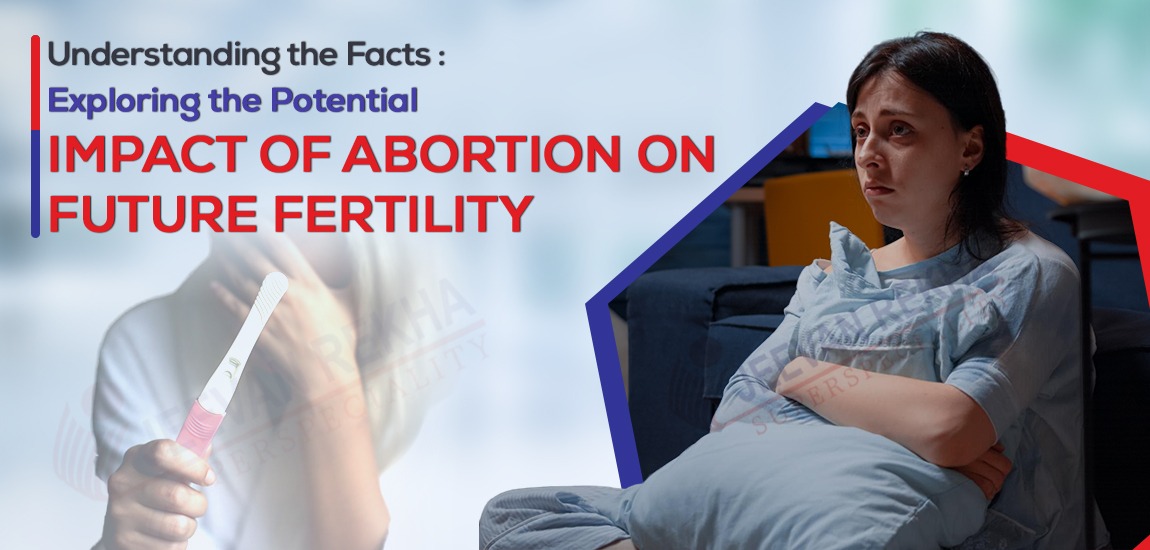
- By Admin
- In Health and Tips,
- Posted April 27, 2024
Understanding the Facts: Exploring the Potential Impact of Abortion on Future Fertility
Exploring the potential impact of abortion on future fertility involves delving into a complex interplay of medical, social, and psychological factors. While abortion is a common medical procedure worldwide, questions persist regarding its potential long-term effects on a person's ability to conceive and carry a pregnancy to term in the future.
Research indicates that in the majority of cases, abortion does not significantly impact future fertility. However, certain factors such as the method of abortion, any complications that may arise during the procedure, and individual health considerations can influence outcomes.
Additionally, societal stigmas and emotional responses to abortion may affect individuals differently, potentially impacting their reproductive health decisions. Understanding the nuanced relationship between abortion and future fertility requires a holistic approach that considers medical evidence alongside the broader social and psychological context.
What are the Types of Abortion?
Abortion procedures can be categorised into two main types:
- Medical Abortion (also known as the "abortion pill" or "medication abortion"): This method involves taking medication to terminate a pregnancy. It typically consists of two drugs, mifepristone and misoprostol, taken in sequence.
Mifepristone blocks the hormone progesterone, which is necessary for maintaining the pregnancy, while misoprostol causes contractions to expel the contents of the uterus. Medical abortion is typically used in the early stages of pregnancy, up to around 10 weeks gestation.
- Surgical Abortion: Surgical abortion involves procedures that physically remove the contents of the uterus to terminate the pregnancy. There are several methods of surgical abortion, including:
- Vacuum Aspiration (also known as suction aspiration): This is the most common method of surgical abortion, typically performed in the first trimester of pregnancy. A thin tube attached to a vacuum device is inserted into the uterus to remove the contents.
- Dilation and Curettage (D&C): This method involves dilating the cervix and using a surgical instrument called a curette to remove the uterine lining.
- Dilation and Evacuation (D&E): Similar to D&C, this procedure involves dilating the cervix, which is typically performed in the second trimester of pregnancy. It involves using surgical instruments and suction to remove the contents of the uterus.
Risks associated with abortion:
Abortion, like any medical procedure, carries certain risks and potential complications. These can vary depending on factors such as the method of abortion, gestational age, individual health factors, and the skill of the healthcare provider. Some of the common risks associated with abortion include:
- Incomplete Abortion: In some cases, the abortion procedure may not remove all of the pregnancy tissue from the uterus, leading to an incomplete abortion. This can result in continued bleeding and may require further medical intervention to complete the abortion.
- Excessive Bleeding: Bleeding is a common side effect of abortion, but excessive bleeding (haemorrhage) can occur in rare cases and may require medical attention.
- Infection: Any invasive medical procedure carries a risk of infection. Infection of the uterus (endometritis) or other pelvic organs can occur after abortion, particularly if proper sterile techniques are not followed during the procedure.
- Uterine Perforation: During surgical abortion procedures, there is a risk of unintentional perforation (tearing) of the uterus by surgical instruments. This complication is rare but can require further medical treatment if it occurs.
- Adverse Reactions to Anesthesia: If anaesthesia is used during a surgical abortion, there is a small risk of adverse reactions such as allergic reactions or respiratory problems.
- Emotional Distress: Some individuals may experience emotional distress, including feelings of sadness, guilt, or regret, after undergoing an abortion. This can vary widely depending on individual circumstances and personal beliefs.
- Future Fertility: While research generally suggests that abortion does not have a significant impact on future fertility, there is some evidence to suggest that certain abortion procedures, particularly multiple procedures or those performed later in pregnancy, may be associated with a slightly increased risk of future fertility issues.
Also read: Kleptomania: What It Is, Causes, Symptoms and Treatment
Does abortion impact the future fertility or pregnancy?
The impact of abortion on future fertility and pregnancy is a topic of ongoing research and discussion. Overall, the majority of studies suggest that abortion does not have a significant impact on future fertility for most individuals.
- Medical Evidence: Research generally indicates that abortion, especially when performed safely and without complications, does not impair a person's future ability to conceive and carry a pregnancy to term. Most individuals who have had one or even multiple abortions can conceive and have successful pregnancies later in life.
- Factors Influencing Fertility: Several factors may influence fertility after abortion, including the method of abortion, any complications that arise during the procedure, and individual health factors such as age, overall health, and reproductive history.
- Repeated Abortions: Some studies suggest that multiple abortions may be associated with a slightly increased risk of future fertility issues, such as an increased risk of preterm birth or low birth weight in subsequent pregnancies. However, it's important to note that these risks are generally small, and the vast majority of individuals who have had multiple abortions are still able to conceive and have healthy pregnancies.
- Psychological and Social Factors: The emotional and psychological impact of abortion may vary from person to person and can potentially influence future fertility decisions. Emotional distress following abortion is a complex and individualized experience, and individuals need to seek support if needed.
Conclusion:
At Jeevan Rekha Hospital, we are committed to providing the highest quality care and support to our patients, especially in sensitive matters like reproductive health. As one of the best gynaecology hospitals in Jaipur, we understand the importance of addressing concerns regarding abortion and its potential impact on future fertility. Through evidence-based medical practices and compassionate patient-centred care, we strive to ensure the well-being and reproductive health of every individual who seeks our services.
Our comprehensive approach to reproductive healthcare includes thorough pre-procedure counselling, meticulous attention to safety protocols during abortion procedures and post-procedure follow-up care. We prioritize the physical and emotional health of our patients at every step of the process, aiming to minimize risks and optimize outcomes.
While acknowledging that abortion is a significant decision for individuals, we reassure our patients that the majority experience no long-term effects on future fertility or pregnancy. Our team of experienced gynaecologists and healthcare professionals is dedicated to providing accurate information, support, and guidance to empower individuals to make informed choices about their reproductive health.
At Jeevan Rekha Hospital, we recognize the importance of trust, confidentiality, and respect in our patient-provider relationships. We are committed to upholding these values and continuing to serve as a trusted resource for reproductive healthcare in Jaipur and beyond.
Choose Jeevan Rekha Hospital for compassionate care and expertise in gynaecology services, including abortion care, with the assurance that your well-being is our priority.
Tags
Blog Search
Latest Posts
-
बर्ड फ्लू के लक्षण, कारण, उपचार और बचाव के उपाय जानें
December 04, 2025 -
Best Diet Plan for Menopause Weight Management
November 25, 2025 -
Pulmonary Fibrosis Treatment: Understanding Lung Scarring and Breathing Problems
November 21, 2025 -
Arrhythmia: Types, Causes, Symptoms, and Treatment
November 07, 2025 -
Silent Heart Attack: Causes, Symptoms and Treatment
October 24, 2025




